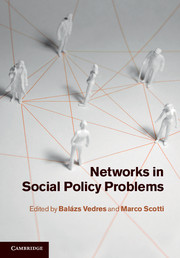Book contents
- Frontmatter
- Contents
- List of contributors
- Acknowledgements
- 1 Introduction
- Part I Information, collaboration, innovation: the creative power of networks
- 2 Dissemination of health information within social networks
- 3 Scientific teams and networks change the face of knowledge creation
- 4 Structural folds: the innovative potential of overlapping groups
- 5 Team formation and performance on nanoHub: a network selection challenge in scientific communities
- Part II Influence, capture, corruption: networks perspectives on policy institutions
- Part III Crisis, extinction, world system change: network dynamics on a large scale
- References
- Index
3 - Scientific teams and networks change the face of knowledge creation
from Part I - Information, collaboration, innovation: the creative power of networks
Published online by Cambridge University Press: 05 September 2012
- Frontmatter
- Contents
- List of contributors
- Acknowledgements
- 1 Introduction
- Part I Information, collaboration, innovation: the creative power of networks
- 2 Dissemination of health information within social networks
- 3 Scientific teams and networks change the face of knowledge creation
- 4 Structural folds: the innovative potential of overlapping groups
- 5 Team formation and performance on nanoHub: a network selection challenge in scientific communities
- Part II Influence, capture, corruption: networks perspectives on policy institutions
- Part III Crisis, extinction, world system change: network dynamics on a large scale
- References
- Index
Summary
There is an acclaimed tradition in the history and sociology of science that emphasizes the role of the individual genius in scientific discovery (Merton, 1968; Bowler and Morus, 2005). This tradition focuses on the guiding contributions of solitary authors, such as Newton and Einstein, and can be seen broadly in the tendency to equate great ideas with particular names; for example: the Heisenberg uncertainty principle, Euclidean geometry, Nash equilibrium, and Kantian ethics. The role of individual contributions is also celebrated through science's award-granting institutions, like the Nobel Prize Foundation (English, 2005).
However, several studies have explored the evident shift in science from this individual-based model of scientific advance to a collaborative model. By building on classic work by Harriet Zuckerman and Robert K. Merton, many authors have established a rising propensity for teamwork in samples of several research fields; with some studies going back a century (Collins, 1998; Cronin et al., 2003; Merton, 1973a; Jones, 2005). For example, Derek de Solla Price examined the change in team size in chemistry from 1910 to 1960, forecasting that by 1980 zero percent of the papers would be written by solo authors (de Solla Price, 1963). According to our research, the mean team size for papers written in chemistry had grown to nearly 3.7 contributors by the year 2000. Recently, Adams et al. (2005) established that teamwork has been increasing over time across broader sets of fields among the most competitive U.S. research universities.
Information
- Type
- Chapter
- Information
- Networks in Social Policy Problems , pp. 47 - 59Publisher: Cambridge University PressPrint publication year: 2012
